Blow Out the Moon (4 page)

“No!” our mother said. She hardly ever says no like that. “Tomorrow the movers are coming while you’re in school and the next day we’re leaving.
You need to do this now.
”
“Is tomorrow our last day of school?” I said, and she said it was.
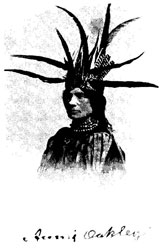
The real Annie Oakley, who was the best shot in the West. She met her husband when she beat him in a shooting contest.
“Will You Miss Me?”
It was our last whole day and the very last day of school, Miss Jessup said anyone who wanted to could make a card for me. While she was passing out the paper, Henry said, “What will Libby do?”
“She can draw or write whatever she wants.”
I decided to make a goodbye card for the class. I wondered how many people would make cards for me.
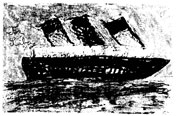
An ocean liner a boy drew.
I could tell that they were all coloring by the way their arms were moving. But even though I could see some of the drawings, I didn’t know if they were cards for me. Even when they were done, I didn’t know, because Miss Jessup collected them all.
“I’ll give them to you at the end of the day, Libby,” she said.
So I had to wait until we had put our chairs up and were standing on line, waiting for the bell. And then, finally, when we were walking out, she gave me a stack of cards — a thick stack.
It felt like most people had made me one! I flipped through them: I could tell right away that lots of the girls had. There were little pictures, all colored in. They had put their addresses on the back (Miss Jessup told them to do that) and “Love,” after the messages and before their names. I was surprised that the girls liked me so much! Or maybe that’s just how girls write?
I counted the cards: twenty. But there were twenty kids in the class. Could she have put my card in the pile by mistake? Or had I made a mistake counting?
I looked through more carefully and saw that even Miss Jessup had made a card! Hers didn’t have a picture, just the school’s address in small, neat handwriting. Inside, she had written:
Dear Libby,
Your English school will be different, and perhaps difficult. You have a good mind and many abilities: use them. Try your best, even in those subjects that do not appeal to you. And remember that while you are in a foreign land, you are a representative of America. You may, perhaps, be the only American your teachers and schoolmates will ever meet. Make your behavior embody the ideals that have made Americans throughout history proud of themselves and of our country.
With best wishes
,
Minerva Jessup
That was nice of her!
Henry had drawn a picture of a boat with LIBERTY in big letters on the side. Inside, he’d written:
Libby
I will see you in six months. Write to me as soon as you get there and I will write back.
Your friend
,
Henry Hart
Well, no BOY would sign a card “Love.” I wouldn’t either!
I counted the cards again. This time, too, it came out to twenty — so everyone had made one. I was reading them all in order when Henry came running up.
“Look.”
He held out a fortune-catcher — but I couldn’t choose anything, because the four squares at the top were blank. Then he opened it and inside I read:
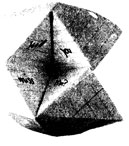
He closed it (fortune-catchers always look like little mouths closing and opening to me), and when he opened it the other way it said:
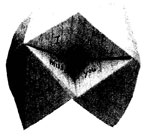
“Yes,” I said out loud. “I’ll miss you a lot.”
We just looked at each other without saying anything, and then he ran across the street. After he crossed he turned around and waved and I waved back as hard as I could. I really, really like Henry. I
would
miss him — but it was good that he would miss me, too.
I looked at his card again, and decided to put it, and the fortune-catcher, inside
Grimm’s Fairy Tales,
so they wouldn’t get ripped on the voyage.
The Liberté
We were on our way: Everything was packed, our house was clean and locked, and the
Liberté
was moving slowly out of New York Harbor with us on the deck. My mother took Emmy’s hand and told me to hold Willy’s. She was already carrying Bubby.
“Really, Libby,” she said, in a serious voice. “I don’t want any of you out of my sight.”
So we stood right next to her. We watched New York (all the skyscrapers) spread out in a line and little baby waves moving and sparkling below us.
And then above us — high above us — I saw the Statue of Liberty. I’d never realized before how HUGE it is. One arm was bigger than a tall building.
“Look, Willy, look!” I said. “The Statue of Liberty!”
Liberty! I raised my free arm up to the sky, the way she was holding hers, and held it there.
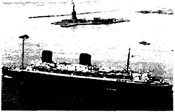
The Liberté sailing out of New York Harbor. The big shape between the ship and the shore is the Statue of Liberty.
“She was put there to welcome all the people from other lands who came to America,” I said.
I thought of my grandparents coming from Finland, and my great-great somethings coming from England and Scotland and Norway, and of all the other people who came to America: thousands and thousands of them, all brave and adventurous and full of hope. And they were all welcomed. I felt very proud of them and of our country, proud to be an American.
Willy tugged at my hand and I looked down: He was saluting, too, with his free hand. He smiled proudly at me and I squeezed his hand and smiled back. Liberty!
By dinner, we were, I thought, out of America, and on the Atlantic Ocean — and even if where we were didn’t count as a new country (my mother said we were “in international waters”), it felt like we were in one.
The Dining Salon was very fancy. Everyone had assigned tables, and a huge man — taller and bigger than my father and a little bit fat (but on him it didn’t look bad to be fat because he was so big) — sat with us at ours.
He had a dark, proud, serious face. He sat very straight and square, like a king with his arms on his throne. But what was really fascinating was that he wore a huge feathered headdress — not like an Indian’s: his was a kind of turban with big feathers of all different colors around it. He wore wonderful pale green robes that went down to the ground (I bent down under the tablecloth and looked).
I was wondering if he was a king, or at least a prince or chieftain, when my mother shook her head at me, just a little bit, but I knew that she meant, “It’s rude to stare.”
She had given us a little talk about manners before we left our cabin for the Dining Salon, and I knew that she really wanted us to be polite. It was hard, but I looked around the room and tried not to look back at him too often.
All the tables were round and covered with long, white tablecloths that seemed very thick. I asked the waiter questions whenever I could; the most interesting answer was: “When it gets rough, we pour water on the tablecloths to keep the dishes from sliding off the tables.”
“When will that happen?” I said. He said it probably wouldn’t; most crossings were calm. Still, I thought, it
might
happen on ours. I hoped it would.
After dinner, we went to our cabins. Emmy and I had a cabin to ourselves, which was very exciting.
“Be sure to keep the door locked,” my mother said again when she kissed us good-night, “and don’t unlock it for anyone but me.” Her cabin — which Willy and Bubby were in, too — was right next door to ours. Still, it was pretty cool to have our own.
It was cozy, with just room for a little table and chair and a mirror (all screwed in), and another chair in a tiny alcove under the porthole. You could stand on the chair to look out the porthole — only it was shut with a round metal shutter, painted the same creamy white as the walls, and locked.
“Let’s get in bed,” I said. We had already decided to take turns sleeping in the top bunk, and the first night, it was mine. I climbed up into it: It had a lamp above the pillow so you could read in bed. I hung my little metal horse on the lamp by its bridle.
The sheets were thick and kind of scratchy: They didn’t feel like our sheets at home at all. They were tucked in VERY tightly and I had to wriggle around for a long time before I felt comfortable.
“What are you doing?” Emmy said from the bottom bunk.
I hung my head over the side of the top bunk and looked down at her with my head upside down.
“Getting settled in.”
I made a face and she made one back.
“What will we do tomorrow?” she said.
“Explore the ship.”
“Don’t you want to go in the playroom?”
The playroom had a baby-sitter in a white uniform and the kinds of toys that girlie-girls and very little children like. It was perfect for Willy: lots of blocks.
“You can — I’d rather explore.”
As soon as breakfast was over, we did.
First, we ran up to the deck (our cabin and the Dining Salon were below the deck). It was narrow and crowded with grown-ups lying in deck chairs, or walking slowly, or playing a really boring game kind of like hopscotch, or just standing around, leaning their elbows on the wall that circled the deck — this was painted a creamy white, like everything else on the ship. They were looking out — at what? What could they see? All I could see was sky and water. I jumped up, to see more, but there was nothing out there but sky and water.
